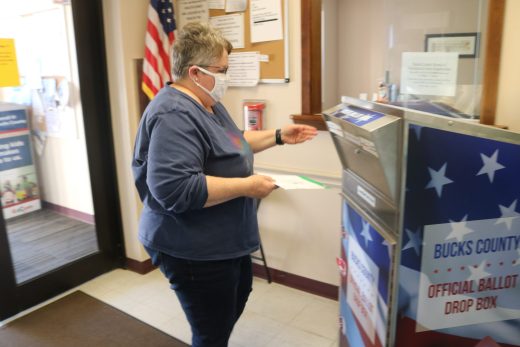By Peter Hall | Pennsylvania Capital-Star

The federal appeals court that upheld Pennsylvania’s requirement for voters to write the date on mail-in ballots has declined a request by voting rights groups to reconsider the decision.
A panel of U.S. 3rd Circuit Court of Appeals judges ruled in March that Act 77, which gave voters the option of casting ballots by mail without an excuse, does not violate a federal prohibition on disenfranchising voters over inconsequential paperwork errors.
The American Civil Liberties Union of Pennsylvania petitioned the court to reargue the case before a larger panel of judges. In a three-page order on Tuesday, Circuit Judge Thomas L. Ambro said a majority of the 14-judge court had voted against rehearing the case.
ACLU-PA spokesperson Ian Pajer-Rogers said Tuesday the organizations, which include the Pennsylvania State Conference of NAACP Branches, the League of Women Voters, and Make the Road Pennsylvania, are reviewing their options.
While voters who are away from home or unable to get to the polls on Election Day have had the option of casting absentee ballots for decades, Act 77 allowed any eligible voter to request a ballot that they could complete and return by mail or in person.
Since the law took effect for the 2020 primary election, some voters have been confused by the requirement to write the date the ballot was completed on the outside envelope before returning it. Some voters wrote their date of birth or neglected to date the envelopes altogether.
The questions of whether the dating requirement is mandatory or runs afoul of ballot access provisions of the federal Civil Rights Act have been the subject of a series of court decisions.
Most recently, the 3rd Circuit struck down a lower court ruling and set up a potential U.S. Supreme Court battle, and will almost certainly affect how the swing state’s ballots are handled in the upcoming presidential election.
At issue is the materiality provision of the Civil Rights Act of 1964, which prohibits officials from denying anyone from voting because of an error or omission “on any record or paper relating to any application, registration, or other act requisite to voting,” unless it is material to the person’s qualification to vote.
In the court’s 2-1 decision March 27, Ambro wrote for the majority that although the date isn’t used to determine whether a ballot is received on time, the requirement doesn’t run afoul of the Civil Rights Act. The provision only applies when the state is determining who may vote, Ambro added, “and does not apply to rules, like the date requirement, that govern how a qualified voter must cast his ballot for it to be counted.”
Ambro, who was nominated by President Bill Clinton, noted that the date requirement “serves little apparent purpose,” but since the state’s Supreme Court ruled that dating of envelopes was mandatory, “undated or misdated ballots are invalid under state law and must be set aside.”
Circuit Judge Patty Shwartz, who was nominated by President Barack Obama, wrote in a dissenting opinion that the ruling was a reminder to voters to carefully review all instructions.
“If they do not, they risk having their otherwise valid votes discounted based on even the most inconsequential mistake,” Shwartz wrote.
Pennsylvania Capital-Star is part of States Newsroom, a network of news bureaus supported by grants and a coalition of donors as a 501c(3) public charity. Pennsylvania Capital-Star maintains editorial independence. Contact Editor Kim Lyons for questions: info@penncapital-star.com. Follow Pennsylvania Capital-Star on Facebook and Twitter.








